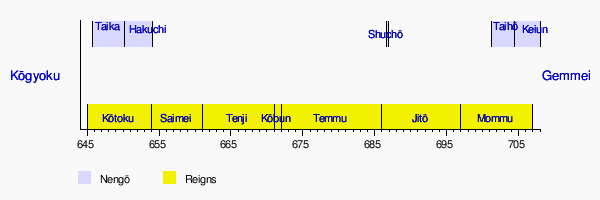Taihō (era)
| History of Japan |
|---|
Taihō (大宝) was a Japanese era name (年号 nengō, "year name") after a late 7th century interruption in the sequence of nengō after Shuchō and before Keiun. This period spanned the years from March 701 through May 704.[1] The reigning emperor was Monmu-tennō (文武天皇).[2]
History
In 701, also known as Taihō gannen (大宝元年), the new era name Taihō (meaning "Great Treasure") was proclaimed to memorialize the creation of the "great treasure" of codified organization and laws. The new era commenced on the 21st day of the 3rd month of 701.[3]
Timeline
| Timelines of early Japanese nengō and Imperial reign dates |
|---|
 |
The system of Japanese era names was not the same as Imperial reign dates.
Events of the Taihō era
- 701 (Taihō 1): Plans for sending a diplomatic mission to the Tang court was approved.[4]
- 702 (Taihō 2): The Taihō Code or Code of Taihō (大宝律令 Taihō-ritsuryō) or Taihōryō reorganizing the central government and completing many of the reforms begun by the Taika Reforms in 646.[5]
- 702 (Taihō 2): A mission to the Tang court, led by Awata no Mahito (粟田真人), embarked on their journey to China, traveling by ship.[4] This was called the "embassy of Taihō" because it was begun during this era.[6]
Notes
- ↑ Nussbaum, Louis-Frédéric. (2005). "Taihō" in Japan Encyclopedia, p. 924, p. 924, at Google Books; n.b., Louis-Frédéric is pseudonym of Louis-Frédéric Nussbaum, see Deutsche Nationalbibliothek Authority File.
- ↑ Titsingh, Isaac. (1834). Annales des empereurs du Japon, pp. 60–63; Brown, Delmer et al. (1979). Gukanshō, pp. 270–271; Varley, H. Paul. (1980). Jinnō Shōtōki. pp. 137–140.
- ↑ Brown, p. 271.
- 1 2 Fogel, Joshua A. (2009). Articulating the Sinosphere: Sino-Japanese Relations in Space and Time, pp. 102–107; publisher's blurb;
- ↑ Asakawa, Kan'ichi. (1903). The Early Institutional Life of Japan, p. 13.
- ↑ Ponsonby-Fane, Richard. (1962). Sovereign and Subject, p. 244.
References
- Asakawa, Kan'ichi. (1903). The Early Institutional Life of Japan. Tokyo: Shueisha. OCLC 4427686; see online, multi-formatted, full-text book at openlibrary.org
- Brown, Delmer M. and Ichirō Ishida, eds. (1979). Gukanshō: The Future and the Past. Berkeley: University of California Press. ISBN 978-0-520-03460-0; OCLC 251325323
- Fogel, Joshua A. (2009). Articulating the Sinosphere: Sino-Japanese Relations in Space and Time. Cambridge: Harvard University Press. ISBN 9780674032590 ISBN 0674032594; OCLC 255142264
- Ponsonby-Fane, Richard Arthur Brabazon. (1962). Sovereign and Subject. Kyoto: Ponsonby Memorial Society. OCLC 1014075
- Titsingh, Isaac. (1834). Nihon Ōdai Ichiran; ou, Annales des empereurs du Japon. Paris: Royal Asiatic Society, Oriental Translation Fund of Great Britain and Ireland. OCLC 5850691
- Varley, H. Paul. (1980). Jinnō Shōtōki: A Chronicle of Gods and Sovereigns. New York: Columbia University Press. ISBN 978-0-231-04940-5; OCLC 59145842
External links
- National Diet Library, "The Japanese Calendar" -- historical overview plus illustrative images from library's collection
| Preceded by — |
Era or nengō Taihō 701–704 |
Succeeded by Keiun |
| Preceded by Jitō period 686–697 |
Imperial reign dates Monmu period 697–707 |
Succeeded by — |
This article is issued from Wikipedia - version of the 10/8/2016. The text is available under the Creative Commons Attribution/Share Alike but additional terms may apply for the media files.